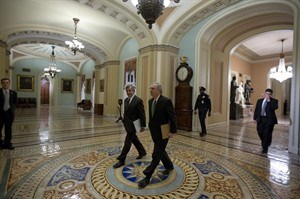
Sen. Mike Johanns, R-Neb., left, walks with Senate Minority Leader Mitch McConnell from Kentucky, to the Senate floor for a vote on the fiscal cliff, on Capitol Hill Tuesday, Jan. 1, 2013 in Washington. The Senate passed legislation early New Year's Day to neutralize a fiscal cliff combination of across-the-board tax increases and spending cuts that kicked in at midnight. (AP Photo/Alex Brandon)
January 01, 2013 - 8:25 AM
WASHINGTON - U.S. lawmakers hoped Tuesday to resolve any uncertainty over the so-called "fiscal cliff" before financial markets reopen the following day, with the House of Representatives poised to consider urgent legislation approved by the Senate in a middle-of-the-night New Year's drama unlike any other in the history of Congress.
The legislation was only part of the grand deal President Barack Obama had hoped to make with lawmakers on addressing the country's chronic deficit spending, meaning that his administration and a bitterly partisan Congress face more showdowns on fiscal issues in the months ahead.
Economists, who have warned that the "fiscal cliff" would spin the country back into recession, were warning that even a limited agreement to avoid it could still dent economic growth this year.
The deal under consideration Tuesday tackles one of the most sensitive issues: higher taxes. The measure is the first significant bipartisan tax increase since 1990.
It would prevent taxes from going up on the poor and middle class but would raise rates on households making more than $450,000 a year. It would also block deep spending cuts for two months and extend unemployment benefits for the long-term unemployed.
The measure cleared the Senate on an 89-8 vote not long after midnight Tuesday, hours after Vice-President Joe Biden and Senate Republican Leader Mitch McConnell, veteran negotiators, sealed a deal.
Biden emerged with a thumbs-up signal of progress from one in a series of tense meetings Monday as the midnight deadline to avoid tax increases for almost all Americans and more than $100 billion in spending cuts loomed. Exhausted lawmakers mixed in hallways with young aides in party dresses, reminders of the New Year's Eve parties usually on the schedule.
Those deep spending cuts will have to be addressed in the coming weeks and months, along with an increase in the government's borrowing limit as it seeks to pay its bills. The midnight deadline Monday had been set back in 2011 as motivation for the Obama administration and Congress to get serious about taking sweeping action to address deficit spending that has averaged about $1 trillion a year.
The top Republican in Congress, House Speaker John Boehner, pointedly refrained from endorsing the agreement what was on the way to his chamber, though he promised a vote on it or a Republican alternative right away.
He was expected to encounter opposition from House conservatives, who oppose any tax increase at all. It was not clear when a House vote might happen.
Boehner planned to brief his party members Tuesday afternoon, and Biden scheduled a separate meeting with House Democrats.
President Barack Obama, who had campaigned for re-election on the promise of protecting households making under $250,000 a year from a tax increase, praised the agreement after the Senate's vote. Some liberal Democrats were disappointed that the White House did not stick to a harder line in negotiations, considering that Obama no longer faces re-election.
"While neither Democrats nor Republicans got everything they wanted, this agreement is the right thing to do for our country and the House should pass it without delay," Obama said in a statement. "This agreement will also grow the economy and shrink our deficits in a balanced way — by investing in our middle class, and by asking the wealthy to pay a little more."
The sweeping Senate vote exceeded expectations — small-government tea party conservatives backed the measure — and would appear to give momentum to the measure despite lingering questions in the House, where conservative forces sank a recent bid by Boehner to permit taxes to rise on incomes exceeding $1 million, returning them to Clinton-era levels of the 1990s.
The measure also allocates $24 billion in spending cuts and new revenues to defer, for two months, some $109 billion worth of automatic spending cuts that were set to hit the Pentagon and domestic programs starting this week. That would allow the White House and lawmakers time to regroup before plunging quickly into a new round of budget negotiations.
Other features of the measure:
— It would raise the top tax rate on large estates to 40 per cent, from 35 per cent.
— Taxes on capital gains and dividends over $400,000 for individuals and $450,000 for couples would be taxed at 20 per cent, up from 15 per cent.
— Jobless benefits for the long-term unemployed would be extended for an additional year at a cost of $30 billion.
— Another $64 billion would go to renew tax breaks for businesses and for renewable energy purposes, like tax credits for energy-efficient appliances.
Even die-hard conservatives in the Senate endorsed the measure, arguing that the alternative was to raise taxes on virtually every earner.
"I reluctantly supported it because it sets in stone lower tax rates for roughly 99 per cent of American taxpayers," said Sen. Orrin Hatch. "With millions of Americans watching Washington with anger, frustration and anxiety that their taxes will skyrocket, this is the best course of action we can take to protect as many people as possible from massive tax hikes."
___
Associated Press writer Andrew Taylor in Washington contributed.
News from © The Associated Press, 2013